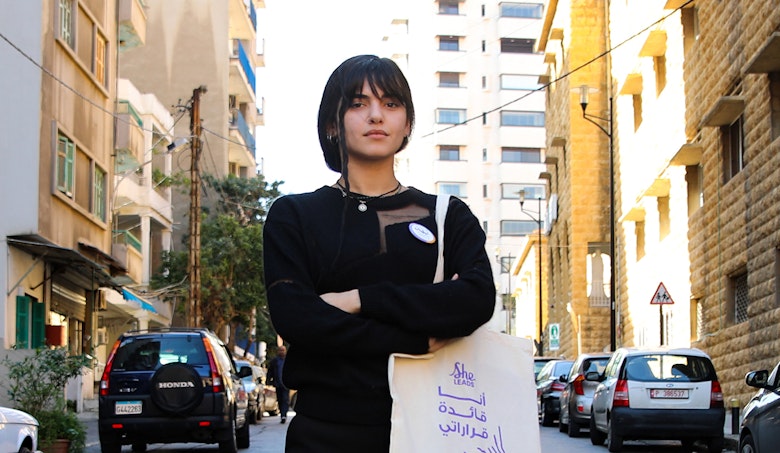She Leads activists plead for digital opportunities at UN in New York
Give girls the same opportunities as boys, even when it comes to digital accessibility. This is the message of Lilian (26) from Lebanon and Hiqmat (21) from Ghana to United Nations (UN) member states at the Commission on the Status of Women in New York. On behalf of the She Leads program, Lilian and Hiqmat address the member states.
No access to internet, laptops and phones
Every year around International Women's Day (March 8), the Commission on the Status of Women takes place. For two weeks, UN member states and civil society organizations come together to advocate for women's rights and gender equality. Lilian and Hiqmat have been fighting for girls' rights and inclusion within She Leads for some time. Before traveling to New York, the youth activists participated in several trainings focused on lobbying and advocacy at the UN.
This year's theme is "Innovation, technological change and education in the digital age for achieving gender equality." An important theme, Lilian and Hiqmat think, because girls and women in particular often do not have laptops or phones at their disposal. And especially in rural areas and poorer neighborhoods, there is no good Internet connection or girls and women do not have money for this. This restricts girls and young women's development, as education, for example, is increasingly taught partly digitally.
Online harassment and violence
Moreover, girls often do not learn to use digital tools properly and safely. In the Palestinian refugee camp where Lilian grew up, she saw that girls did not know how to use the Internet safely. "The Internet can be a dangerous place. Because digital skills are not considered important for girls, many girls don't know their rights. Such as the right to privacy and protection. As a result, they are often blackmailed, harassed or intimidated online."
"Girls are expected to marry"
Girls in Ghana also often do not learn digital skills, Hiqmat says. "In Ghana, girls are expected to marry and take care of the household. Education for girls is not considered important. So they often don't develop digital skills either, such as how to use a phone or how to keep yourself safe on the Internet."
Online education
The lack of digital tools and skills limits girls in school. While education is especially important for girls. Lilian: "In rural Lebanon, women and girls hardly get any education. They stay in their villages. If girls have access to the Internet, they can get education online. Then they have more opportunities to develop themselves and are no longer solely dependent on their husbands, fathers and brothers."
Gateway to the world
That is why Lilian and Hiqmat are pleading with United Nations member states to take action. "Digital skills are the gateway to the rest of the world. We can use these skills to earn a good income of our own. Ultimately, this will lead to economic development of the whole community, the whole country and even the whole world."
She Leads is a five-year program (2021-2025) of Terre des Hommes, Plan International, Defence for Children-ECPAT and the African Women's Development and Communication Network (FEMNET), in strategic partnership with the Ministry of Foreign Affairs. We are implementing the program in East Africa (Uganda, Ethiopia, Kenya), West Africa (Ghana, Mali, Sierra Leone, Liberia) and the Middle East (Lebanon, Jordan) and at national and international levels. Working with a large network of organizations spread across these nine countries, we fight for the rights, leadership and self-determination of girls and young women.
About She Leads
She Leads is a five-year program (2021-2025) of Terre des Hommes, Plan International, Defence for Children-ECPAT and the African Women's Development and Communication Network (FEMNET), in strategic partnership with the Ministry of Foreign Affairs. We are implementing the program in East Africa (Uganda, Ethiopia, Kenya), West Africa (Ghana, Mali, Sierra Leone, Liberia) and the Middle East (Lebanon, Jordan) and at national and international levels. Working with a large network of organizations spread across these nine countries, we fight for the rights, leadership and self-determination of girls and young women.

